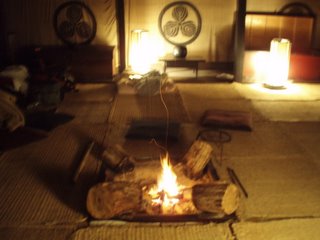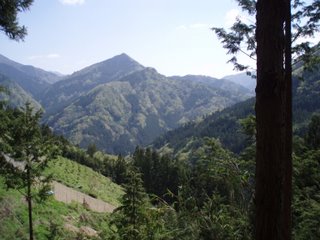Three Years on a Rock
There is a proverb in Japanese that reads "石の上には三年" (ishi no ue ni wa sannen). The appropriate English equivalent would read something like "patience wins the day," but if one were to translate the epigram literally, it would read something like "there are three years on a rock." Today my first contact with a teacher at school brought a vision of the end: my plane ticket out of Japan. Looking at the calendar for days that would fit my busy schedule of moving things out, squaring away my future life, etc., I realized not only how long three years is, but how short it can become. I think it is Samuel in Steinbeck's East of Eden who observes this, 'Lord! How quickly the day passes when we don't look at it, and how slowly it moves when we do.' And so I think to myself: How closely have I looked at these three years? That might be the most important question to ask right now, the only one worth asking. Lately I have come across questions of all sorts, from very practical ones that all adults face every day, "what do I need to get done today, this week, this month, etc?", to moral ones "is it right for me to...and why or why not?", to metaphysical ones, "what is...?" These queries are all great practice for our critical thinking skills, as certainly everyone in this age of commodious thinking and imagining machines doesn't work the brain out in such necessary ways nearly enough. Despite the need for critical, creative thought, there is still an ultimately urgent need for patience, for humility, for us to recognize that however so dearly we cling to the delusions of the ego, of being one's own creator (thus relegating all others to mirrors in which one sees oneself in omnipotent, albeit illusory, splendor), one's life only becomes full, only becomes real among others: yes, we must also come to terms with the ugency of something which no longer makes sense in the present age of questioning it all not for the sake of illumination, but for the sake of rearranging the shadows within the cave. Thus the questions of deconstruction, of severing our ties from the world as it is, only serve to give us a break from our real task. It takes time for the mouse to chew away the ropes that bind our arms and legs, but someday we may be free.
I ask myself often, "What next?" It is understood by most people close to me that I am worried about my life--my future, to be exact. No. This question needs not be made in distress. I often fail in my delivery, thus sounding a little exasperated by the thought of change, of return. But my question is certainly one of hope, a hope that is furnished by enduring patience, a willingness to listen to the call from across the void. It is something within me and outside of me, calling me to live my life to its end. I too often catch myself chasing my tail, or stopping too long on the road to remember in which direction I was facing. But remember, the road of life is always how. Often we think that there is a single destination we are called to reach when one talks of vocation, of a calling. No, it is mere how, the degree to which we live and look at the day--the fact that we are moving and not standing still. It is something to keep in mind throughout all our days on this big rock, something for which we remain in patience, in hope: making ourselves available every day for that which fulfills one's life.
I ask myself often, "What next?" It is understood by most people close to me that I am worried about my life--my future, to be exact. No. This question needs not be made in distress. I often fail in my delivery, thus sounding a little exasperated by the thought of change, of return. But my question is certainly one of hope, a hope that is furnished by enduring patience, a willingness to listen to the call from across the void. It is something within me and outside of me, calling me to live my life to its end. I too often catch myself chasing my tail, or stopping too long on the road to remember in which direction I was facing. But remember, the road of life is always how. Often we think that there is a single destination we are called to reach when one talks of vocation, of a calling. No, it is mere how, the degree to which we live and look at the day--the fact that we are moving and not standing still. It is something to keep in mind throughout all our days on this big rock, something for which we remain in patience, in hope: making ourselves available every day for that which fulfills one's life.







